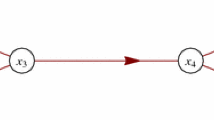Abstract
We consider the problem of collective choice in a tournament, i.e., when the majority relation, which plays the role of the collective preference system on this set of alternatives, can be represented by a complete asymmetric oriented graph. We compare three solutions of the collective choice problem: minimal dominating, uncovered, and minimal weakly stable sets. We construct generalizations of the minimal dominating set and find out, with their help, how the system of dominating sets looks like in the general case. We formulate a criterion that determines whether an alternative belongs to a minimal weakly stable set. We find out how minimal weakly stable sets relate to uncovered sets. Based on the notion of stability of an alternative and the set of alternatives we construct generalizations for the notions of uncovered and weakly stable sets—the classes of k-stable alternatives and k-stable sets. We prove inclusion relations between these classes.
Similar content being viewed by others
References
Plott, C., A Notion of Equilibrium and Its Possibility under Majority Rule, Am. Econom. Rev., 1967, vol. 67, no 4, pp. 787–806.
Ward, B., Majority Rule and Allocation, J. Conflict Resolut., 1961, vol. 5, pp. 379–389.
Smith, J., Aggregation of Preferences with Variable Electorates, Econometrica, 1973, vol. 41, no 6, pp. 1027–1041.
Fishburn, P., Condorcet Social Choice Functions, SIAM J. Appl. Math., 1977, vol. 33, pp. 469–489.
Miller, N., Graph-theoretical Approaches to the Theory of Voting, Am. J. Polit. Sci., 1977, vol. 21, pp. 769–803.
Schwartz, T., Collective Choice, Separation of Issues and Vote Trading, The Am. Polit. Sci. Rev., 1977, vol. 71, no 3, pp. 999–1010.
Aleskerov, F. and Kurbanov, E., A Degree of Manipulability of Known Social Choice Procedures, in Current Trends in Economics: Theory and Applications, Alkan, A., Aliprantis, Ch., and Yannelis, N., Eds., Berlin: Springer, 1999, pp. 13–27.
Miller, N., A New Solution Set for Tournaments and Majority Voting: Further Graph-Theoretical Approaches to the Theory of Voting, Am. J. Polit. Sci., 1980, vol. 24, pp. 68–96.
Schwartz, T., The Logic of Collective Choice, New York: Columbia Univ. Press, 1986.
Duggan, J., A Systematic Approach to the Construction of Non-Empty Choice Sets, Social Choice and Welfare, 2007, vol. 28, pp. 491–506.
Author information
Authors and Affiliations
Additional information
Original Russian Text © A.N. Subochev, 2010, published in Avtomatika i Telemekhanika, 2010, No. 1, pp. 130–143.
This work was supported by the Scientific Fund of SU-HSE, project no. 08-04-0008.
Rights and permissions
About this article
Cite this article
Subochev, A.N. Dominating, weakly stable, and uncovered sets: Properties and generalizations. Autom Remote Control 71, 116–127 (2010). https://doi.org/10.1134/S0005117910010091
Received:
Published:
Issue Date:
DOI: https://doi.org/10.1134/S0005117910010091




